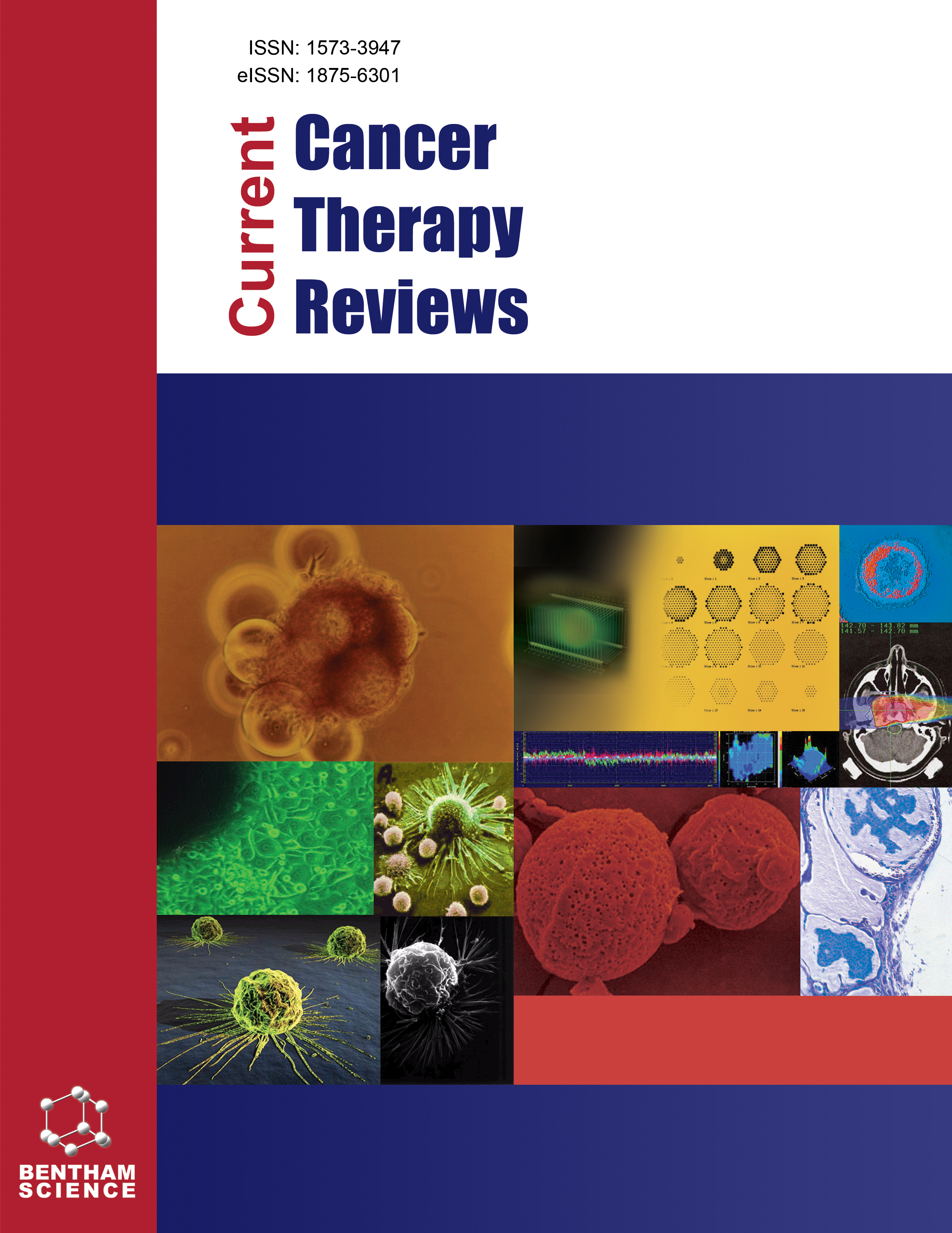- Home
- A-Z Publications
- Current Cancer Therapy Reviews
- Previous Issues
- Volume 20, Issue 4, 2024
Current Cancer Therapy Reviews - Volume 20, Issue 4, 2024
Volume 20, Issue 4, 2024
-
-
Early Detection of Colorectal Cancer: Conventional Techniques and Current Biomarkers
More LessColorectal cancer (CRC) is the third most common cancer worldwide, and the incidence of CRC seems to increase gradually. The survival of CRC varies in different countries, attributed to the screening program. Generally, diagnostic approaches for CRC can be divided into visual detection methods and laboratory methods. Colonoscopy, sigmoidoscopy, and computed tomography colonography are considered visual method Read More
-
-
-
An Insight into Mesoporous Silica Nanoparticles: Ray of Hope for Cancer Management
More LessAuthors: Chetan Singh Chauhan, Akash Garg and Rutvi AgrawalCancer is one of the fatal diseases leading to a high mortality rate. The conventional formulations available for the treatment of cancer are associated with several drawbacks. The major ones are increased side effects due to improper tumor selectivity, metastasis of cancer cells and development of multi-drug resistance to available chemotherapeutic drugs. The development of nanobased formulations for the treatm Read More
-
-
-
Management of Cancer using Photodynamic Therapy: Advancement and Applications
More LessAuthors: Deepika Yadav, Pramod Sharma, Prem Mishra and Rishabha MalviyaPhotosensitizers (PS) are effective in treating a wide range of tumours using the timetested technique of photodynamic therapy (PDT). Light has been employed for centuries as a curative modality due to its efficacy. Since the effects of using certain dyes in conjunction with light irradiation were first proven around the turn of the 20th century, new PDT methods have been created. Current research focuses mostly on metho Read More
-
-
-
A Review on Indole as a Cardinal Scaffold for Anticancer Drugs Development
More LessAuthors: Meenakshi Rana, Rajeev Ranjan, Niladry Sekhar Ghosh, Dharmendra Kumar and Ranjit SinghChemotherapy is the mainstay of therapeutic cancer therapy; however, the development of resistance typically makes it less effective. There are continuous efforts by researchers to find novel lead compounds with potent anti-cancer activity. Generally, synthetic or natural heterocyclic compounds have been investigated in detail as a scaffold for cancer therapeutics. Among them, indole, owing to its unique physiochemi Read More
-
-
-
Streptomyces Paradigm in Anticancer Therapy: A State-of-the Art Review
More LessCancer is one of the biggest threats to human health with a global incidence of 23.6 million, mortality of 10 million, and an estimated 250 million lost in disability-adjusted life years (DALYs) each year. Moreover, the incidence, mortality, and DALYs have increased over the past decade by 26.3%, 20.9%, and 16.0%, respectively. Despite significant evolutions in medical therapy and advances in the DNA microarray, proteomi Read More
-
-
-
The Therapeutic Effects of Bromelain against Colorectal Cancer: A Systematic Review
More LessBackground: Colorectal cancer (CRC) is one of the most prevalent cancers worldwide. Objective: Considering the side effects of chemotherapy treatments, we reviewed the anti-cancer effects and mechanisms of bromelain on colon cancer cells in this study. Methods: The PRISMA guidelines were followed in the design of this systematic review. Various databases, including PubMed, Web of Science, Cochrane Library, and Scop Read More
-
-
-
Identification of Potential Lead Compounds against BCL-2 through In-silico Screening of Phytochemicals of Nigella sativa and Cuscuta reflexa for Oral Squamous Cell Carcinoma Management
More LessAuthors: Fazulunisa Begum N., Pratibha Ramani, Mukesh Doble and Abilasha RamasubramanianSignificance of the Study: In silico analysis is frequently used in physicochemical characterisation, the discovery and improvement of novel compounds with affinity to a target, and the elucidation of absorption, distribution, metabolism, excretion, and toxicity features. Aim and Objective: The aim of this study is to assess the efficacy of Nigella sativa and Cuscuta reflexa in targeting Bcl2-antiapoptotic protein in Oral Squam Read More
-
-
-
Effects of Vitamins E and D on Mechanical Properties of Breast Cancerous Cells
More LessBackground: Several investigations have demonstrated that vitamins can treat or prevent cancer by altering actin filaments and inhibiting cell migration and proliferation. Vitamins D and E are fat-soluble. This research aims to determine the short-term impact of vitamin D and E on the mechanical properties of breast cancer cells before comparing them with normal breast cells. Methods: Atomic force microscopy (AFM) Read More
-
Volumes & issues
-
Volume 21 (2025)
-
Volume 20 (2024)
-
Volume 19 (2023)
-
Volume 18 (2022)
-
Volume 17 (2021)
-
Volume 16 (2020)
-
Volume 15 (2019)
-
Volume 14 (2018)
-
Volume 13 (2017)
-
Volume 12 (2016)
-
Volume 11 (2015)
-
Volume 10 (2014)
-
Volume 9 (2013)
-
Volume 8 (2012)
-
Volume 7 (2011)
-
Volume 6 (2010)
-
Volume 5 (2009)
-
Volume 4 (2008)
-
Volume 3 (2007)
-
Volume 2 (2006)
-
Volume 1 (2005)
Most Read This Month
Article
content/journals/cctr
Journal
10
5
false
en


